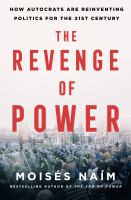 Fareed Zakaria seems a good source for interesting ideas. Moises Naim visited a second time with a new book that seemed worthy to read.
Fareed Zakaria seems a good source for interesting ideas. Moises Naim visited a second time with a new book that seemed worthy to read.
In a previous book Moises pointed out that power was being diffused. The average person had access to information. In effect many micro powers have developed as many were able to break from isolation with their interests and concerns. All the factors in "The End of Power" (2013) are still active. Check: http://www.therealjohndavidson.com/2014/08/the-end-of-power.html
The focus expressed in this book is that autocrats and would be autocrats are constantly trying to consolidate their power. Their strategies are not all new, but technology has given them more tools and they seem to be progressing faster than democracy.
Silvio Berlusconi represents an earlier parallel to Donald Trump. In 1994 he had worked himself up from a cruise boat singer to a media conglomerate owner. He had built up a playboy image and was being investigated for tax evasion and bribery. He decided to start a political party. His media staff became candidates and he used his dominating resources to good advantage. Like Trump, Berlusconi cultivated publicity. He became leader of one of the largest economies in the world.
Rodrigo Duterte with his death squads met a concern with people fearful of violent drug dealers with a solution that met their concerns. The simple solution to a serious problem.
In contrast Hugo Chavez was a good listener and understood concerns of the poor. Author was a cabinet minister under Nicolas Maduro. When he got power he expropriated much land and started a spiral that ended up in poverty and disaster.
Daron Acemoglu and James Robinson point out that nations fail when those who produce wealth lose faith with the state's impartiality and realize that the fruits of their labor are likely to be plundered and transferred to the politically connected. Check: http://www.therealjohndavidson.com/2012/11/why-nations-fail.html
The best targets for autocrats are disappointed people, those who find their lifestyle and their dreams declining.
Populists refer to elites as aloof and out of touch. Expertise is discounted. This allows those striving for power to offer their own simpler solutions. This leads to polarization as their fans take sides against the established opposition. Lately the truth is blatantly overwhelmed with a new "truth." Surveys showed that anti-expertise voters were key to the Brexit campaign.
Followers identify with Trump by not wearing masks and not getting vaccinated. For many segments it has reached the stage where marriage and dating decisions are affected by identify. When celebrity leaders break a norm, their fans do not turn on them, instead they turn on the norms.
Pandemic accelerated some movement and also revealed incompetence. Inequality has increased and inflation has been another outcome. Trump lost the 2020 election in part because of his incompetence revealed during the pandemic.
Autocrats support one another. Currently we are seeing OPEC, Brazil, Hungary, Iran and others lending support to Russia when it attacked Ukraine despite no provocation. An interesting observation is that autocrats congratulate one another as legitimizing actions that also boost their egos. Trump had been told by insiders to avoid congratulating Putin, but he could not resist. The author maintains that Russia did interfere in the 2016 election as did other nations including China, Turkey, Iran and the United States.
Autocrats can evolve to criminal activities. The author points to Venezuela where kickbacks to drug dealers eventually led to the government taking over sections of the trade. Other nations have gotten involved in weapons, cigarettes, even illegal immigrants. Russians have used Interpol to chase after dissidents--check: http://www.therealjohndavidson.com/2022/10/freezing-order.html
Can anything be done?
Electoral systems do make a difference. Gerrymandering in effect is letting politicians select their voters. Citizens United legalized actions that would be illegal in other jurisdictions and raised the ceiling on campaign costs. Lack of trust in experts has allowed bombastic politicians to con us--check http://www.therealjohndavidson.com/2022/07/expertise-too-often-shunted-aside.html
Citizen Assemblies bring random voters together to discuss the issues (with neutral advice). Their recommendations are to be put to a vote in Parliament or Congress. As it is many votes are deferred for political reasons despite being favored by a majority of citizens.
Journalism can play a role. There had been a trend towards what might be called "bothsiderism" which basically means both sides get to present their case even if one side is dishonest and hateful. The truth gets shunted aside. Who decides what is truth? Naim's earlier book demonstrated that because people have more access to information and to each other they formed little groups with more power than they had as individuals and those dynamics are still happening. Politics is more than entertainment and more than a horse race.
Education is critical. One survey pointed out that most Americans could not pass a United States citizenship exam, yet civics courses have been cut in many jurisdictions. Critical thinking should be part of all courses.
The Big Lie is still believed by too many. It seems strange that no actual proof has been found for this provocative claim. It is likely that for many it is really an excuse to attack their opposition. Some are contemplating forbidding election deniers elected political positions.
The author offers thoughts and suggestions how to fight autocrats, but perhaps a good start would be for more people to read this book. Admittedly it adds to our discomfort for the future, but it does offer some remedies.
A view of leadership that takes us back to origins may expand your understanding: http://www.therealjohndavidson.com/2014/07/selected.html
No comments:
Post a Comment